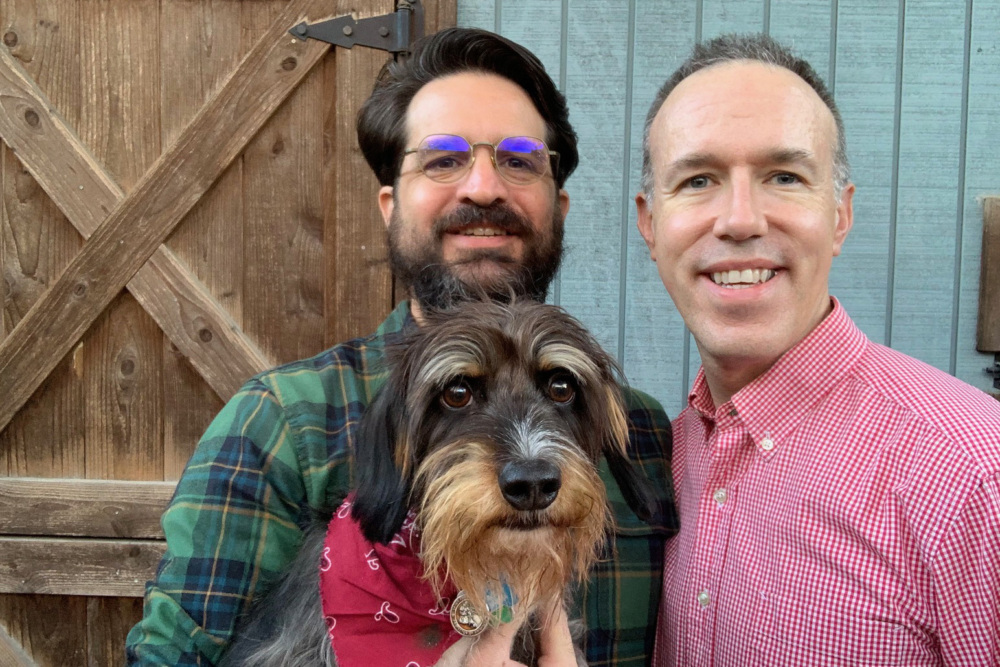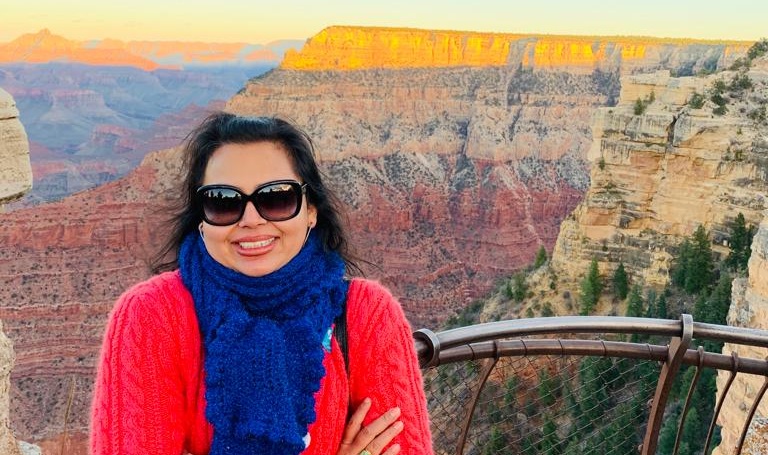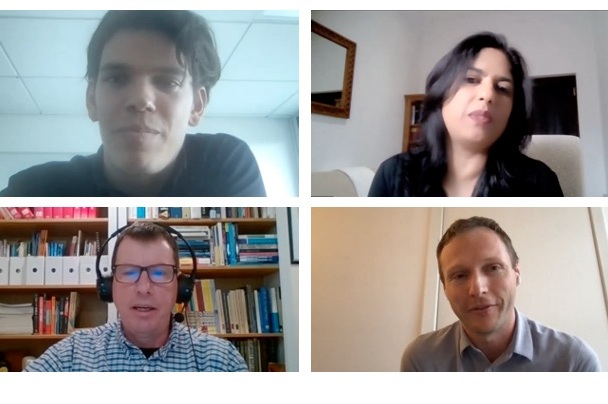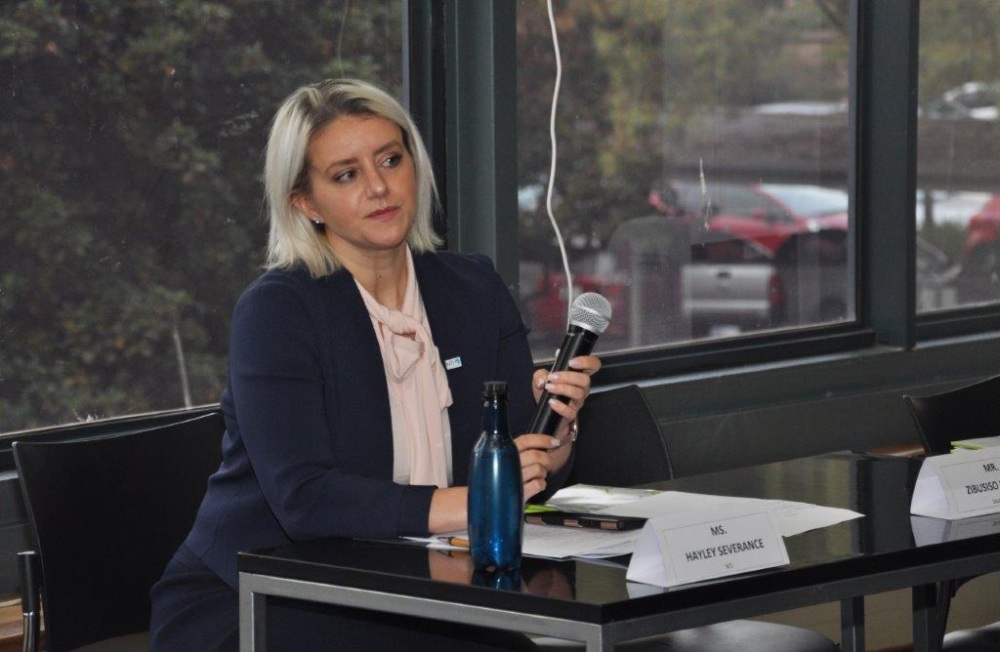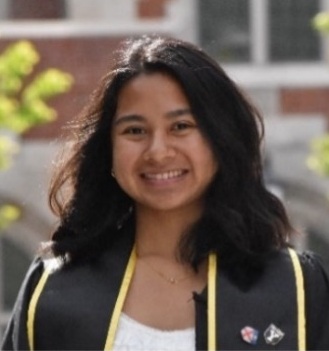
Hannah Hernandez
Intern, Communications
Atomic Pulse
NTI is committed to highlighting and supporting LGBTQIA + voices in national security during Pride Month and beyond. Hannah Hernandez, NTI’s communications intern, had the opportunity to speak with NTI | bio Senior Director Nathan A. Paxton about equitable global health policies and overcoming stereotypes.
I’m excited to interview another California native! You have an extensive background working in Congress and academia. How did you develop an interest in global health and infectious diseases?
After undergrad, where I studied history and international relations, I had to decide between “regular” work or academia, and I said, “Well, I think I’d like to try academia.” So, I started at Berkeley’s graduate school to get a Ph.D. in Political Science. While there, I started to study the HIV pandemic. This was back in the late ‘90s when the pandemic was a huge global, political, and social event, and, frankly, political science was a discipline that lacked research on the pandemic. I was living in the San Francisco Bay area at the time, one of the places where the gay male community had been decimated by the HIV pandemic, and when I would go out or hang out with friends, I would see that, demographically, there were a lot fewer people about roughly 10 years older than me than there should have been. Essentially, there was a missing generation of gay men.
Then, I transferred to Harvard’s Ph.D program and wrote my dissertation on how countries select their HIV policies and how they decide what’s on their own menu of options. From there, I went into teaching and took a position at American University in Washington DC to teach global health and international relations theory. A few years later, I received a fellowship to work in Congress for about a year. It offered a great opportunity to become more familiar with American politics and see how some policies on global health, HIV options, and international development were set from the congressional side.
That’s been quite a journey. How did you come to work at NTI?
I had a great experience as a staffer on the Hill. However, it is very hard to be proactive in Congress. A lot of the work that one does is reactive to whatever the events of the day are—and I don’t mean that as a knock on anything. Legislators should be reactive to the things going on because their constituents will care about them, but I wanted the chance to think a little more deeply about policy issues and to have the opportunity to learn things in more depth again. So, I went after a post-Hill job at a think tank or global organization. NTI is known around DC as a good organization on the issues I cared about in terms of global health and health security. It also creates programs, prompts thinking, and crafts reports—all things I was interested in. A friend of mine who had previously worked at NTI, as well as a couple other people, alerted me to the possibility of working with the organization and said, “Hey, there’s this job there and it might fit you.” So, I looked and it kind of did.
What types of projects have you been working on so far? Are there any projects that you’re looking forward to doing in the future?
I’ve got a mix of things. Right now, I’m working on the Global Health Security (GHS) Index, collaborating with a couple of other people here at NTI plus teams at Economist Impact and Brown University’s School of Public Health Pandemic Center. The second thing I’m working on is ways in which we can disincentivize countries from wanting to obtain biological weapons. We’re just beginning this project; we’re considering holding a series of workshops to bring together people from academia, think tanks, and government to think through what would help us to navigate and solve this problem. The third big thing I’m working on is assisting NTI | bio with its US government engagement, especially congressional advocacy efforts. I have experience in this area based on my time on the Hill, and I want to help craft effective ways that we can try to engage and educate policymakers in Congress on biosecurity, biosafety, and global health issues.
At this point in your career, can you reflect on any obstacles you’ve encountered in the establishment of inclusive and equitable health policies?
We know from research that paying greater attention to human rights—including LGBTQIA+ rights—and equity concerns leads to better policy outcomes. But we also know from our own [NTI] research – findings of the 2021 GHS Index – that most countries neglect the preparedness needs of vulnerable populations. The perceived challenges in achieving equitable policy outcomes are generally around resource limitations—that attention to human rights will add complication or cost to assistance programs; we need to make it easier for implementers of development policies to see how they include general human rights and LGBTQIA+ human rights and that these are net positive. Most policies, rightly so, prioritize getting people fed or providing basic medications and other such necessities. Many implementers and policy writers would love to do more relating to human rights and LGBTQIA+ rights but need more resources to do it all. So, they see human and LGBTQIA+ rights as an add-on to policies instead of integral to their eventual reach and success. We should try to make it so that rights are not this exotic add-on, but just a normal component of programming, because attention to rights makes the policies work better. We need to incorporate them in a way that’s sensitive to context but doesn’t put our human rights commitments as the United States or as donor countries in the back seat to our humanitarian commitments.
Are there any other reflections you would want to share with other members of the LGBTQIA+ community or people in other underrepresented communities who are interested in working on global health policy, biosecurity, or related issues?
The fact that I started my career working on HIV and was an openly queer person approximately 25 years ago was almost stereotypical to some extent. I think that often the things that we pursue early on in our careers are things that we’re really interested and excited about. These interests are often based on who we are, the perspective we are coming from, and our life experiences. The difficulty that people in any sort of underrepresented community face is that there’s this sort of danger that people will stereotype you or pigeonhole you. That’s probably a thing to be aware of, but don’t let it determine too much of where you’re going to go if you really intend to have a long career in a particular issue area. Your interest will often sustain you when nothing else will. I kept working on HIV policy issues because there were interesting, knotty puzzles, and they related to my identity. If I had let the idea that I was going to be pigeonholed concern me too much, I probably wouldn’t have kept at it for as long as I did. It also may help to see how the work that you yourself are doing is connected to a larger community.
Thank you for sharing more about your background and experience with me! One last unrelated question: I know you have a dog and, as a fellow dog-lover, can you tell me about him?
I have a wirehaired dachshund named Oscar. We’ve had him for about six years, and we adopted him when he was just about a year old. We’re members of the Historic Congressional Cemetery Association, and if you’re part of it, you can let your dog be off leash in this big, beautiful cemetery not far from the U.S. Capitol. It’s a nice opportunity to get a little bit of walking time in and let him get some zooms out. We also love going to the bookshop near our house. If I go in without the dog, they’re like, “Oh, we like you, too. But where’s Oscar?”
Sign up for our newsletter to get the latest on nuclear and biological threats.
Aparupa Sengupta, senior program officer for NTI’s Global Biological Policy and Programs team (NTI | bio), sat down with NTI’s Mary Fulham for the latest in Atomic Pulse’s “Get to Know NTI” series.
Today, leaders preparing for the BWC’s Ninth Review Conference in August are exploring whether the global community can leverage increased attention and political will to strengthen the BWC by building mechanisms that increase transparency and trust with the goal of reducing the risk of global catastrophic biological events. A particular aim is determining whether there are effective and politically viable ways to enforce the treaty.
An epidemiologist focused on preventing catastrophic biological events and building health security capacity around the world, Hayley Anne Severance brought her expertise to NTI’s expanding biosecurity team in 2018.
